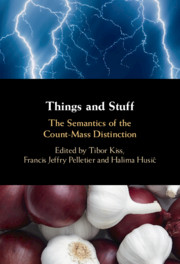27 results
Language Index
-
- Book:
- Things and Stuff
- Published online:
- 21 May 2021
- Print publication:
- 10 June 2021, pp 421-422
-
- Chapter
- Export citation
Contributors and their Affiliations
-
- Book:
- Things and Stuff
- Published online:
- 21 May 2021
- Print publication:
- 10 June 2021, pp xii-xiv
-
- Chapter
- Export citation
Dedication
-
- Book:
- Things and Stuff
- Published online:
- 21 May 2021
- Print publication:
- 10 June 2021, pp v-vi
-
- Chapter
- Export citation
References
-
- Book:
- Things and Stuff
- Published online:
- 21 May 2021
- Print publication:
- 10 June 2021, pp 398-420
-
- Chapter
- Export citation
Tables
-
- Book:
- Things and Stuff
- Published online:
- 21 May 2021
- Print publication:
- 10 June 2021, pp xi-xi
-
- Chapter
- Export citation
Preface
-
- Book:
- Things and Stuff
- Published online:
- 21 May 2021
- Print publication:
- 10 June 2021, pp xv-xvi
-
- Chapter
- Export citation
1 - Editorial Introduction: Background to the Count–Mass Distinction
-
-
- Book:
- Things and Stuff
- Published online:
- 21 May 2021
- Print publication:
- 10 June 2021, pp 1-18
-
- Chapter
- Export citation
Figures
-
- Book:
- Things and Stuff
- Published online:
- 21 May 2021
- Print publication:
- 10 June 2021, pp ix-x
-
- Chapter
- Export citation
17 - Polysemy and the Count–Mass Distinction: What Can We Derive from a Lexicon of Count and Mass Senses?
- from New Empirical Approaches to the Semantics of the Count–Mass Distinction
-
-
- Book:
- Things and Stuff
- Published online:
- 21 May 2021
- Print publication:
- 10 June 2021, pp 377-397
-
- Chapter
- Export citation
Copyright page
-
- Book:
- Things and Stuff
- Published online:
- 21 May 2021
- Print publication:
- 10 June 2021, pp iv-iv
-
- Chapter
- Export citation
Contents
-
- Book:
- Things and Stuff
- Published online:
- 21 May 2021
- Print publication:
- 10 June 2021, pp vii-viii
-
- Chapter
- Export citation
Implications from Individual Languages
-
- Book:
- Things and Stuff
- Published online:
- 21 May 2021
- Print publication:
- 10 June 2021, pp 149-234
-
- Chapter
- Export citation
New Empirical Approaches to the Semantics of the Count–Mass Distinction
-
- Book:
- Things and Stuff
- Published online:
- 21 May 2021
- Print publication:
- 10 June 2021, pp 319-397
-
- Chapter
- Export citation
Compositional Analyses and Theoretical Issues
-
- Book:
- Things and Stuff
- Published online:
- 21 May 2021
- Print publication:
- 10 June 2021, pp 235-318
-
- Chapter
- Export citation
Large-Scale Architectures for Count and Mass
-
- Book:
- Things and Stuff
- Published online:
- 21 May 2021
- Print publication:
- 10 June 2021, pp 19-148
-
- Chapter
- Export citation
Subject Index
-
- Book:
- Things and Stuff
- Published online:
- 21 May 2021
- Print publication:
- 10 June 2021, pp 423-426
-
- Chapter
- Export citation

Things and Stuff
- The Semantics of the Count-Mass Distinction
-
- Published online:
- 21 May 2021
- Print publication:
- 10 June 2021
Contributors
-
-
- Book:
- The Cambridge Dictionary of Philosophy
- Published online:
- 05 August 2015
- Print publication:
- 27 April 2015, pp ix-xxx
-
- Chapter
- Export citation
Logic for Philosophers. By Richard Purtill. New York: Harper & Row. 1971. Pp. xxii, 419. $10.00
-
- Journal:
- Dialogue: Canadian Philosophical Review / Revue canadienne de philosophie / Volume 12 / Issue 1 / March 1973
- Published online by Cambridge University Press:
- 09 June 2010, pp. 171-174
-
- Article
- Export citation
“Incompatibility” in Plato's Sophist
-
- Journal:
- Dialogue: Canadian Philosophical Review / Revue canadienne de philosophie / Volume 14 / Issue 1 / March 1975
- Published online by Cambridge University Press:
- 05 May 2010, pp. 143-146
-
- Article
- Export citation



